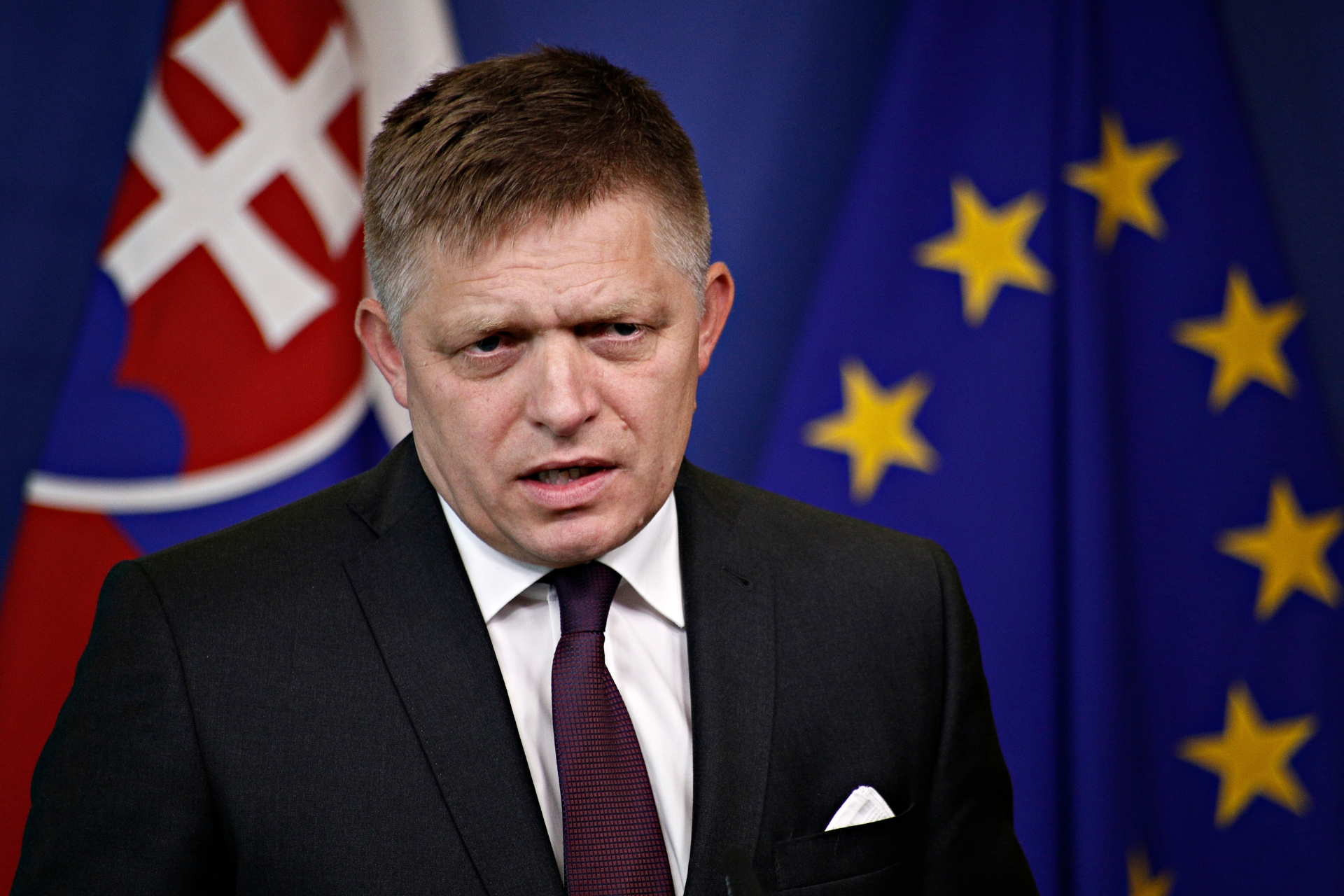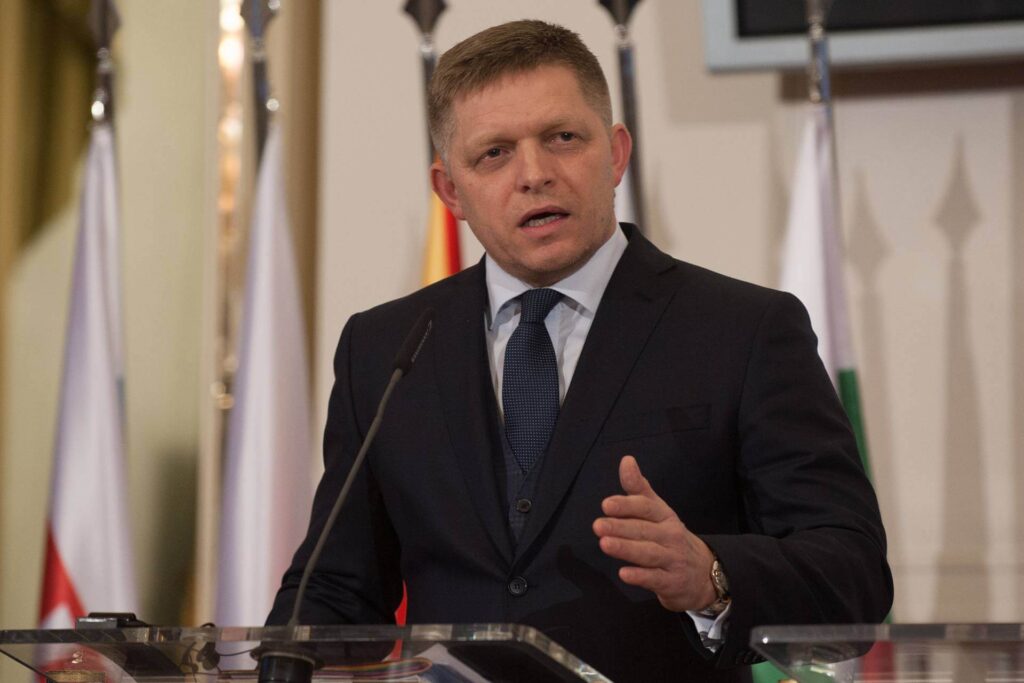In December 2023, protests erupted across Slovakia against the first actions of the new government led by Fico and his party, Direction — Slovak Social Democracy (Smer – Slovenská sociálna demokracia, usually called Smer). Only three months into its mandate, the Fico government is already making crucial changes in the institutional structure of the state. It has approved an amendment to the criminal code that is set to abolish the office of the special prosecutor (Úrad špeciálnej prokuratúry, or ÚŠP). The ÚŠP handles serious crimes like corruption or financial fraud. It oversaw, among other things, the investigation into the murder of journalist Ján Kuciak and his fiancée in 2018. Under the new proposal, regional prosecutors would argue cases before specialized criminal courts.
The rapid purge of the prosecutor’s office and changes to the criminal law quickly drew criticism from Slovak partners and allies, including the European Commission and the US Embassy in Slovakia. The European Parliament recently passed a resolution expressing concerns about Slovakia’s capacity to combat corruption and safeguard the EU budget in the event that the proposed reform of the criminal code is approved.
Domestically, the protesters and opposition leaders consider the government’s actions to be part of a gradual dismantling of the rule of law in the country. Robert Fico, they argue, views the ÚŠP as existential threat to be removed. A petition organized by three opposition parties — Progressive Slovakia, the Christian Democratic Movement and the Freedom and Solidarity party — reads:
We, the citizens of the Slovak Republic, reject attacks on the rule of law, which must be inviolable in a democratic country. Therefore, we ask the Government of the Slovak Republic to withdraw the draft law by which it wants to abolish the Special Prosecutor’s Office, reduce the penalty rates for corrupt criminal activity and remove the status of protected whistleblowers from members of the Police Force.
The petition has gained 81,000 signatures so far.
Fico eliminates a threat to his power
Fico justifies the government’s proposal by claiming that the ÚŠP jeopardizes human rights. According to legal experts, that allegation is just an artificial cover-up for the fact that prosecutors were pursuing organized crime involving people in Fico’s immediate circle, including his party members.
Related Reading
Along with the abolition of the ÚŠP, other “reforms,” such as the reduction of punishments for corruption and economic crime, are also set to be implemented. President Zuzana Čaputová has warned that the proposed changes will take place through an expedited legislative process without expert discussion. Čaputová considers the abolition of the ÚŠP a significant alteration to the existing framework of law enforcement agencies in Slovakia, contradicting the principle of the rule of law.
Following Fico’s proposal, prosecutors involved in ongoing investigations would be transferred to regional offices of the general prosecutor. However, experts point out that the general prosecutor’s office has shown in the past a tendency to use a notorious legal provision (Paragraph 363) to halt entire processes without the possibility of resuming.
Additionally, regional offices lack the resources of the ÚŠP, which had 30 specialized prosecutors dedicated to combating organized crime, with impactful results.
As I wrote in Fair Observer the day before the new government was appointed on October 25, the erosion of democratic institutions, oppression of minorities and the shrinking of the civil society environment is slowly (or, indeed, rapidly) becoming the new political reality in Slovakia.
Proposed personnel changes in key state institutions go beyond the usual post-election transfer of power. They represent systemic changes transforming the entire institutional state. The affected departments are mainly those that Smer wants to get back under its control, those where there is an ideological-cultural struggle or those which present an opportunity for political revanchism.
For example, Fico has changed police leadership, including internal affairs. He has subsequently purged more personnel, laying off investigators who dealt with cases of political corruption. He has also replaced three members of the Judicial Council, a constitutional body that oversees judicial independence.
The new government has carried out many other measures in line with its nationalist ideological agenda. It has reorganized the strategic communication departments and departments for the fight against hybrid threats by firing experts dealing with pro-Russian disinformation narratives. It has also taken control of funds meant for the culture ministry, along with marginalizing artists whose messages the government deems unacceptable.
Finally, the government has announced that it will no longer be officially communicating with four leading media outlets that are critical of Fico. State-owned enterprises will no longer advertise with these outlets. The government is also withholding grants from non-governmental organizations whose ideological orientation it opposes.
Joining the troublemaker club
Fico’s government has already earned comparisons from Slovak observers to the former Slovak Prime Minister Vladimír Mečiar, under whose government in the 1990s Slovakia faced criticism from the West due to the deficit of democracy. According to former Prime Minister Mikuláš Dzurinda, Fico resembles his Hungarian counterpart, Viktor Orbán.
At the EU level, the situation in Slovakia has already become the subject of discussion. Just after the September 30, 2023, Slovak legislative elections, the European Socialist Party suspended the membership of Smer and its coalition partner, Voice — Social Democracy. It did so due to their positions on the Russian war against Ukraine, the rule of law and the LGBTIQ community.
Now, the proposed criminal reforms have raised alarm. The EU public prosecutor’s office sent a letter to the European Commission condemning the proposed changes as a serious threat to the rule of law. The letter also noted that the measures would impact the financial interests of the EU.
The EU faces a new test. How far will it prevent Fico from going with his illiberal plans? It remains to be seen how tough a position the EU will take and what consequences the international community, particularly the EU, will draw from the new domestic situation in Slovakia. At the moment, Fico’s motivation to undermine the rule of law and democratic principles is still high. This might change if the domestic protests and international pressure continue.
On March 23, 2024, with a second round on April 6, Slovaks will vote for their next president. Whether the president comes from the opposition or from the government camp will play a significant role in the further domestic development in Slovakia. President Čaputová currently represents, in the eyes of the opposition parties, the last of the institutional barriers against the implementation of Fico’s nationalist agenda.
“At this pace, no one can stop us.” Robert Fico said in December last year. But Slovakia is still a functioning democracy based on an active civil society and citizen engagement. Not all Slovaks voted for Smer, after all. Indeed, Slovak citizens are the ones who can stop him. Given that they forced Fico out in 2018, it would not even be the first time.
[Anton Schauble edited this piece.]
The views expressed in this article are the author’s own and do not necessarily reflect Fair Observer’s editorial policy.
Support Fair Observer
We rely on your support for our independence, diversity and quality.
For more than 10 years, Fair Observer has been free, fair and independent. No billionaire owns us, no advertisers control us. We are a reader-supported nonprofit. Unlike many other publications, we keep our content free for readers regardless of where they live or whether they can afford to pay. We have no paywalls and no ads.
In the post-truth era of fake news, echo chambers and filter bubbles, we publish a plurality of perspectives from around the world. Anyone can publish with us, but everyone goes through a rigorous editorial process. So, you get fact-checked, well-reasoned content instead of noise.
We publish 2,500+ voices from 90+ countries. We also conduct education and training programs
on subjects ranging from digital media and journalism to writing and critical thinking. This
doesn’t come cheap. Servers, editors, trainers and web developers cost
money.
Please consider supporting us on a regular basis as a recurring donor or a
sustaining member.
Will you support FO’s journalism?
We rely on your support for our independence, diversity and quality.











Comment